To boot or not: Frustrations grow in Nashville over car booting practices, legal oversight
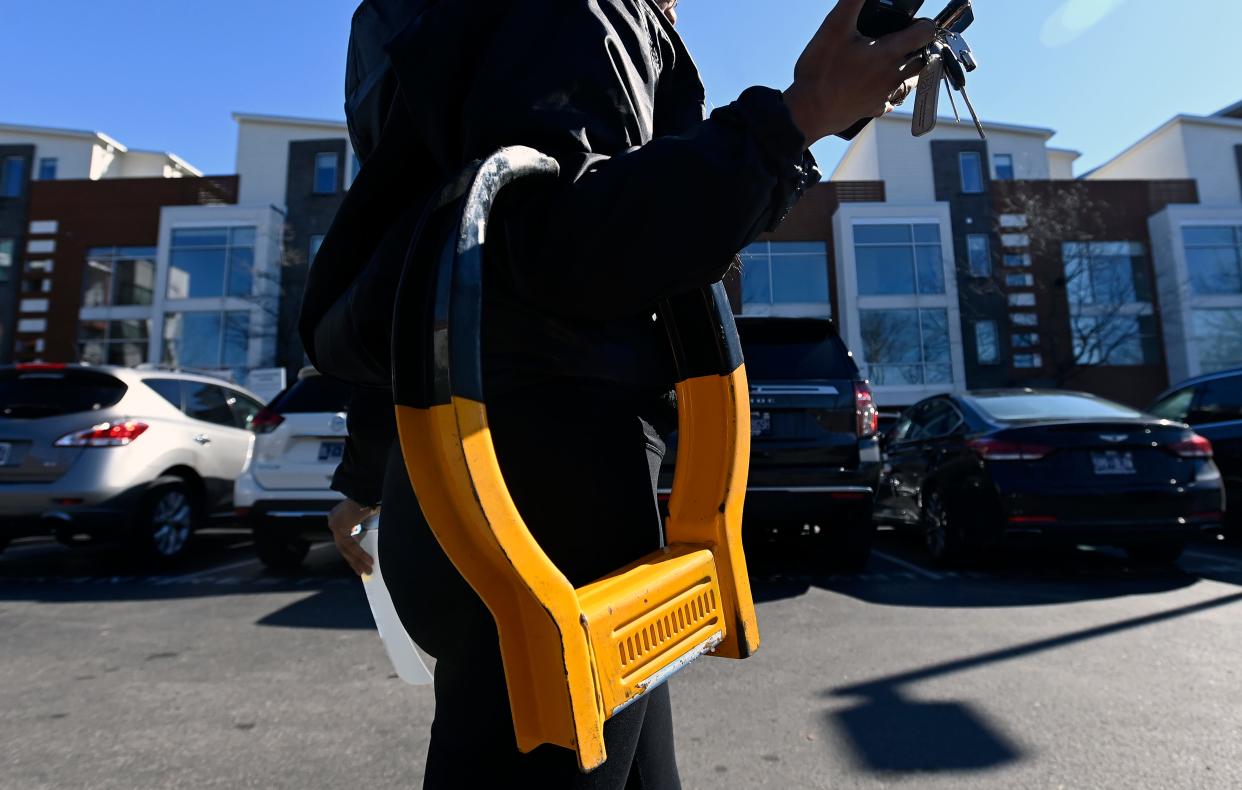
It’s an easy mistake to make.
Customers at the Inglewood post office in East Nashville are parking directly in front of the entrance, not realizing that the spaces are actually in a private lot designated for a cellphone shop and pizza place around the corner.
There are signs posted, but many don’t notice.
And when they come out, some of them will have a metal boot on their car tire and a $75 fee to remove it.
That’s been the case for the past few months at the post office off Gallatin Pike, where staff said a private booting company has been enforcing the rules with vigilance.
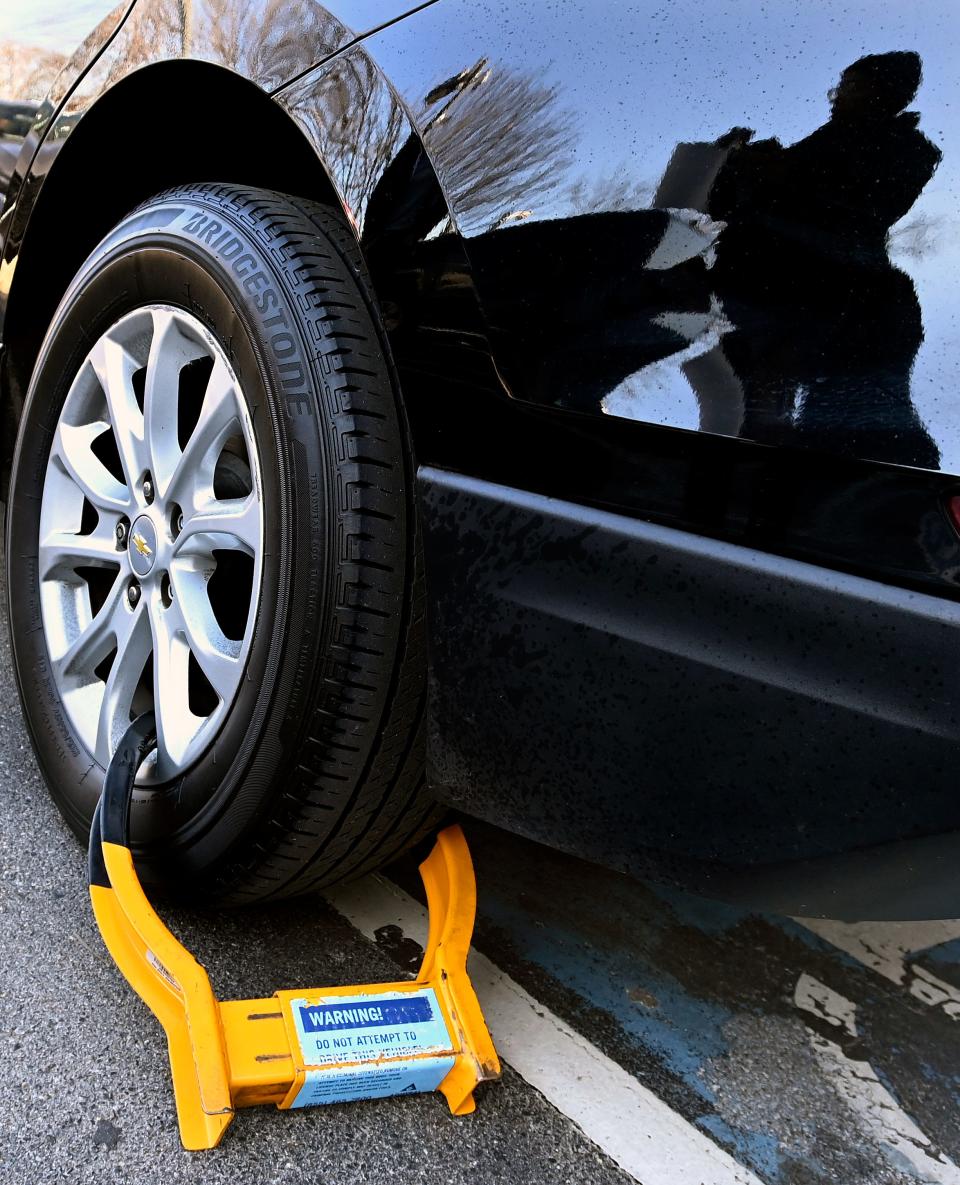
The company, they said, will pounce on unsuspecting drivers within minutes after they step out of their vehicles, with no warning or grace period.
On a Thursday afternoon last month, post office workers were standing outside on their lunch break, warning customers not to park in front of the building.
“Excuse me, ma’am, don’t park here! You’ll get booted!” said an employee, as a driver pulled up.
A red truck with the sign “Parking Authority LLC.” sat waiting nearby.
The situation at the Inglewood post office highlights a growing frustration in Nashville over the city’s practice of allowing property owners to use private companies to enforce parking violations with booting devices, rather than tickets or towing.
While business owners have the right to enforce on their private lots, some residents say the practice feels predatory, with confusing signage, system errors and no way to police bad actors.
One of the largest companies, Nashville Booting LLC, is facing a federal class action lawsuit for allegedly being too quick to boot cars but slow to remove the devices, with some people waiting for hours.
And this month, the company was ordered to refund hundreds of drivers after one resident discovered that it was operating without a valid city permit in December.
State and local lawmakers say they are working on better solutions to the issue, but for now, drivers should be extra wary of where they park.
A controversial practice
Booting by private businesses is banned in many cities, and it’s sparking controversy in places like Chicago and Atlanta, where it’s allowed.
In Atlanta, two local women called the Boot Girls have become TikTok vigilante heroes for using a master key to help people remove the boots for a fee that's cheaper than what the companies charge.
Matt Wetherington, an Atlanta-based lawyer who has represented thousands of drivers in lawsuits against the businesses, believes the practice is a form of false imprisonment.
“Booting at its core is piracy,” he said. “The booting company acts as both the judge, jury and executioner for crimes they have invented. And as a result, they are falsely imprisoning people and not solving the problem they purported to solve. There’s literally nothing about keeping a vehicle in that space that frees up the space for other patrons.”
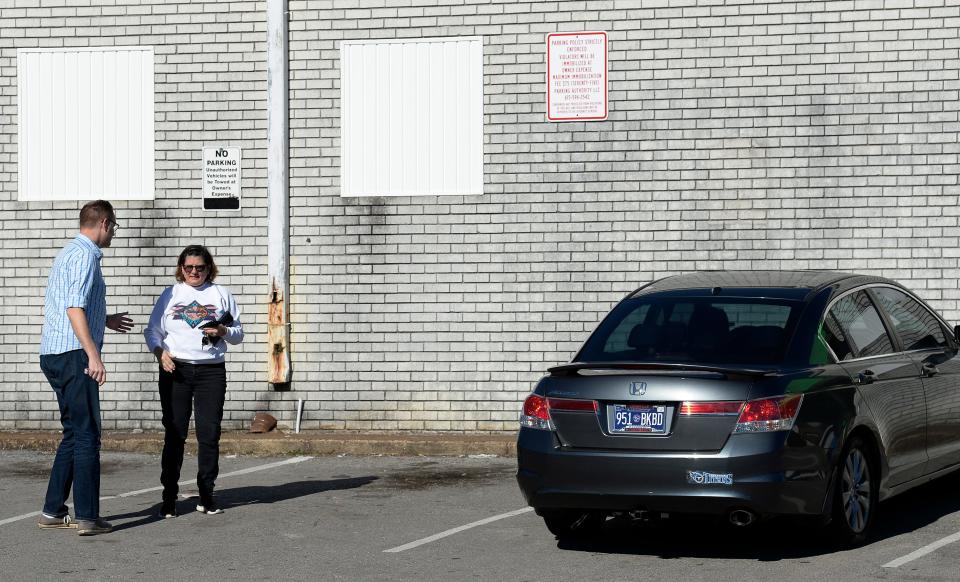
He said it can also be shady.
Wetherington said he’s had cases where business owners and parking lot operators explained in detail how they received illegal kickbacks from the companies for allowing them to boot on their property.
A state bill is pending that would ban the practice across Georgia.
“When you have no safeguards and no enforcement, you’re going to have a system that is rife with problems,” he said.
Booting frustration in Nashville
Nashville requires the businesses to have a permit, but there’s no way of gauging how many vehicles are booted each month because the city doesn’t track the numbers. The city as of February had eight permitted companies.
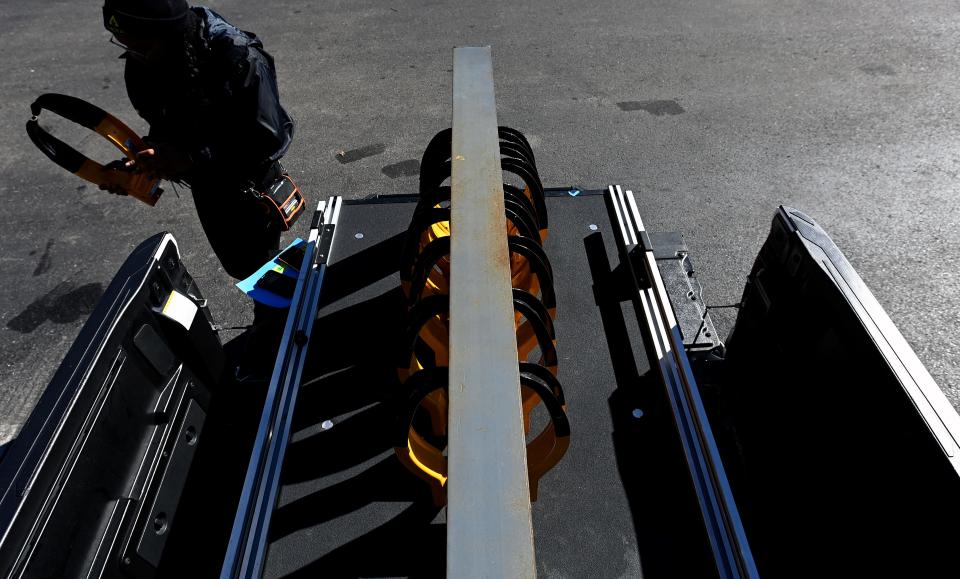
City code does have some safeguards. There’s a $75 cap on how much companies can charge to remove the boot and they can’t take longer than an hour to remove one after a driver has paid the fee.
But residents say it’s not enough.
Readers who reached out to The Tennessean told stories of finding boots on their cars after errors with license plate readers, unclear signage and waiting longer than an hour.
Dylan Thomas said she didn’t see any “no parking” signs when she parked after dark on a gravel strip across the street from O-ku restaurant in Germantown in January.
“There was already a car parked there, so I felt safe parking next to it,” she wrote in an email. “Little did I know, that car was in fact the person calling the booting service!”
When she came back from dinner, her car, along with a whole row of cars, was booted.
Thomas said she paid the fee online and was told a technician was 15 minutes away, but she ended up waiting alone in her car for about an hour, which made her feel unsafe.
She later filed a dispute with the company, but said she had yet to hear back.
The problem at the Inglewood post office has been especially prickly, with droves of residents airing their grievances on Facebook.
“I literally parked for 30 seconds to drop off packages and I got charged $75,” wrote one resident, adding that they didn’t see the sign. “There’s someone there inside the car waiting to give tickets.”
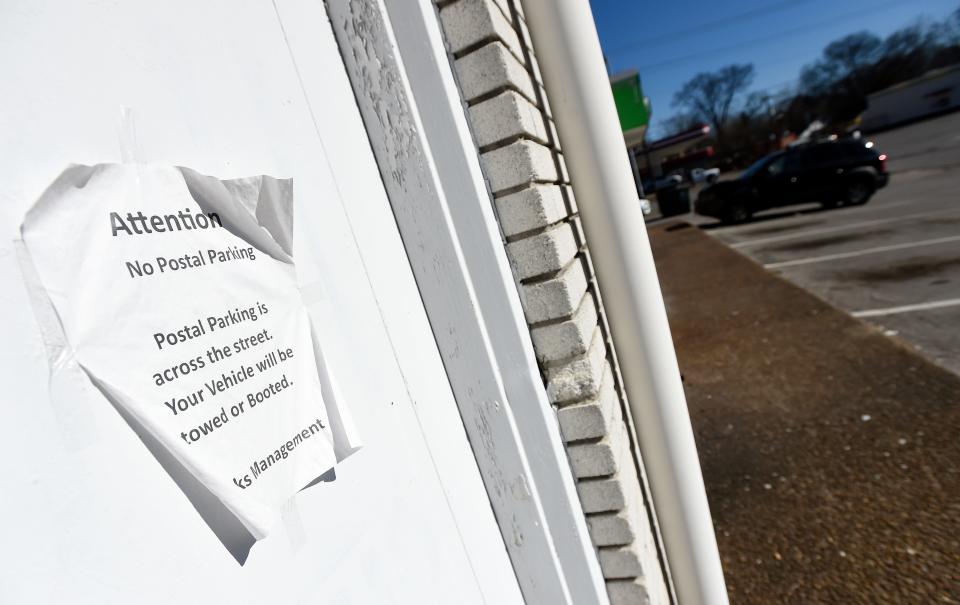
The booting company, Parking Authority LLC, whose listed owner is Kimberly Smith, declined to comment in an email.
The Tennessean reached out to all of the city’s licensed companies. The only one that responded for an interview was Admiral Enforcement.
Chris Lawson, owner of the New Orleans-based company, said he understands people’s frustration, but business owners are frustrated with drivers who ignore signs and take up spots for patrons.
Lawson said towing is time-consuming and expensive, while booting is a quick and strong deterrent.
“Once the word gets out, everybody is pretty compliant,” he said.
However, Lawson said his business tries to set a good example in the industry.
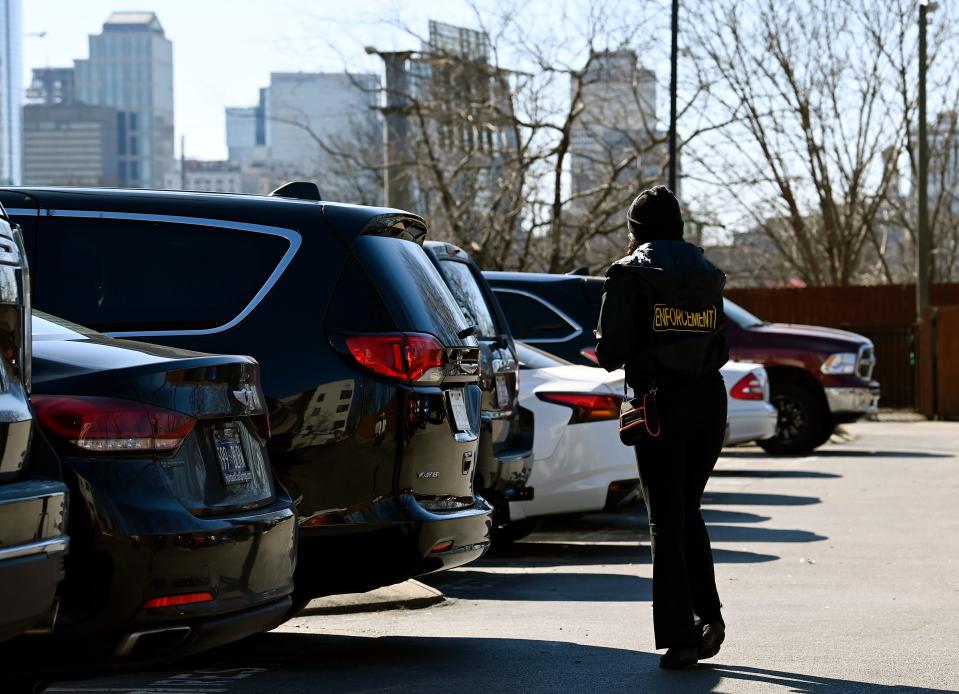
Admiral gives a 30-minute grace period and provides all of its technicians with body cameras for safety. The boots have an electronic option that allows drivers to remove them without waiting for a technician. And if a driver has to wait longer than an hour for a technician, the boot comes off for free.
Lawson said the companies that lie in wait to give tickets give the industry a bad name.
“That’s something we’re trying to get away from,” he said.
Lawmakers plan for changes
Metro Council member Jacob Kupin, whose district covers Downtown Nashville, said he’s been fielding complaints over booting and parking in general since he was elected last year.
He’s been meeting with stakeholders for possible new regulations.
“It’s important for the culture of our city for our residents not to feel like we’re nickel and diming people,” he said.
Among the considerations, Kupin said, the city could require a grace period and prohibit booting for a first offense. There should be some leeway for glitches and errors on the automated pay systems, he said.
“I understand there needs to be penalties for not paying, but we also should not penalize people for errors in the system that could be avoided,” he said.
Kupin said he’s hoping to collaborate with state lawmakers, but a new state law passed last year might trump local efforts.
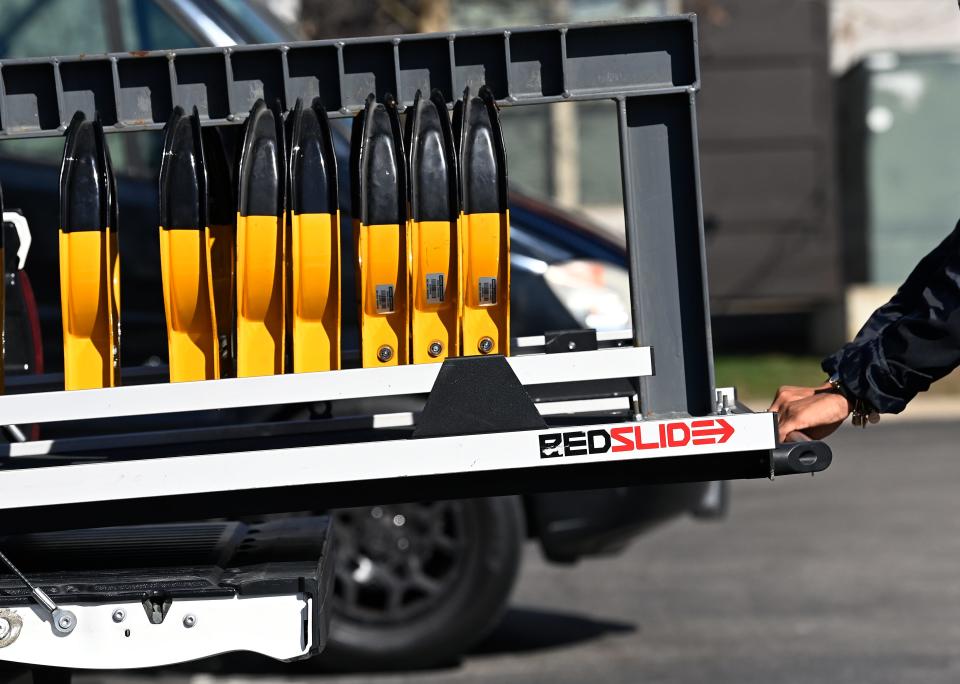
The Booting Consumer Protection Act, which went into effect last July, has safeguards such as requiring booting companies to accept credit cards and prohibits the companies from paying their staff on commission for how many cars they boot.
But while the bill was meant to protect consumers, it included an amendment that lifted the $75 cap on how much companies can charge, so under state law, companies can now charge whatever the y want to remove a boot.
It is unclear what will happen if a business in Nashville starts charging more under the new law.
Senate Majority Leader Jack Johnson, R-Franklin, who co-sponsored the bill, in a statement said the amendment was added after “some members were concerned that a $75 cap would limit business too much.”
But Johnson said he later discovered that many booting services are not associated with registered businesses, making it “nearly impossible to go after bad booting operators.”
He said he’s now working on new legislation this year that will bring back a similar limit on how much companies can charge and “put an end to unfair booting practices.”
“The legislation passed last year was intended to rein in booting services under the Consumer Protection Act,” he said. “Still, more needs to be done.”
Of the eight booting businesses in Nashville, six are actively registered with the Tennessee Secretary of State, while one business, Apex Parking, has an expired license. Nashville Booting is registered in Georgia, records show.
A mass refund for drivers
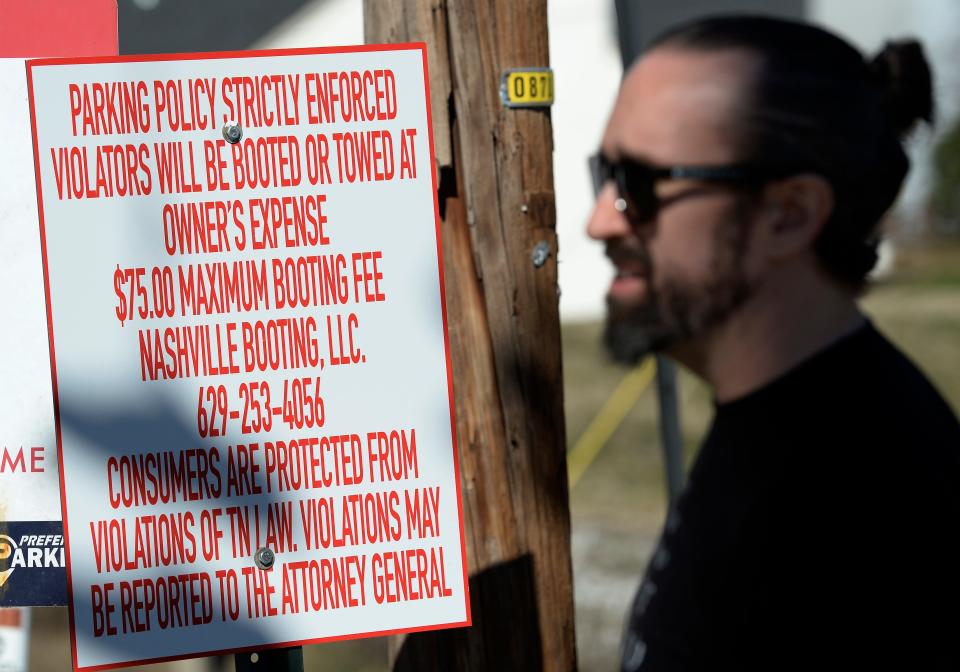
Steven Knapp admits that he didn’t see the sign when his car was booted by Nashville Booting in a lot across the street from Schulman’s bar in East Nashville.
But when he later checked the company’s information, he discovered that Nashville Booting had been operating on an expired city permit when it booted his car on Dec. 8.
Last month, he testified before Metro’s Transportation Licensing Commission, where the city found the business was operating without a permit from Dec. 1 to Dec. 12, 2023.
The licenses for booting businesses are renewed annually, but the renewals are handled by city staff and not approved by the commission.
Brian Miller, a Nashville Booting representative, told commissioners that there was a problem with paperwork where ownership forgot to send in the city payment for its annual renewal.
“You’ve got to come up with some way to refund these folks,” said Commissioner Patrick McNally, a local criminal defense lawyer.
The commission ordered Nashville Booting to refund drivers for the period when it was operating illegally. Miller said the business boots around 150 to 200 cars a week, so the refund will likely include hundreds of drivers.
Knapp, a Nashville native and documentary filmmaker, said the refund was a victory for drivers, but the city should do a better job of enforcing the rules.
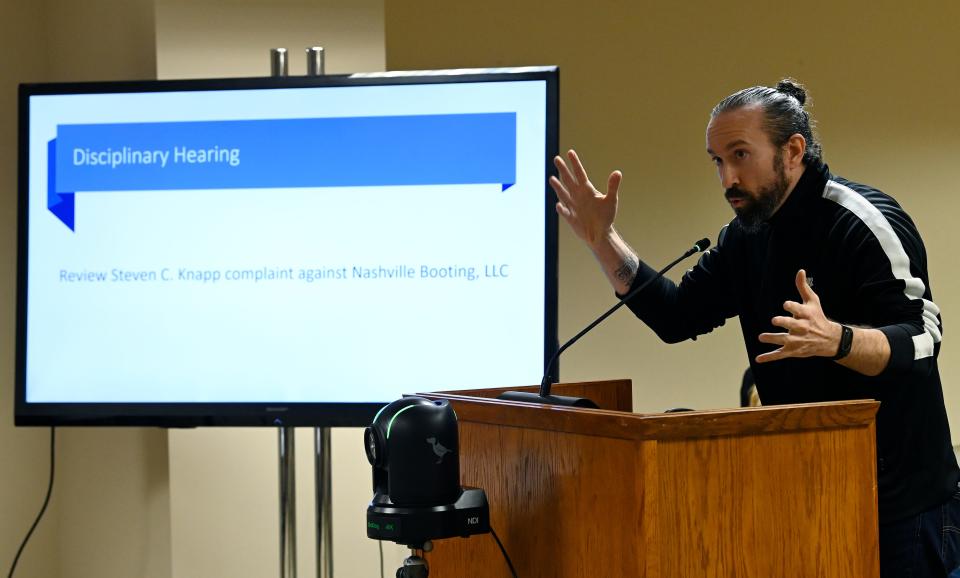
“When they’re not complying and still carrying on their business, that’s a problem,” he said.
'More rotations = more boots = more money'
That’s not the only issue for Nashville Booting.
The Georgia-based business is facing a class action lawsuit alleging that it incentivizes its technicians to boot as many vehicles as possible but doesn’t have the capacity to remove the boots in a timely manner.
Nashville resident Anthony Ladd, one of the named plaintiffs, said he had to wait over seven hours because the company was short of technicians.
The suit alleges that the company, which has been chronically understaffed, pays its technicians entirely on commission and includes text in its employee handbook that says: “More rotations = more boots = more money.”
The company has continued the practice despite being publicly flagged by the Better Business Bureau, the suit notes.
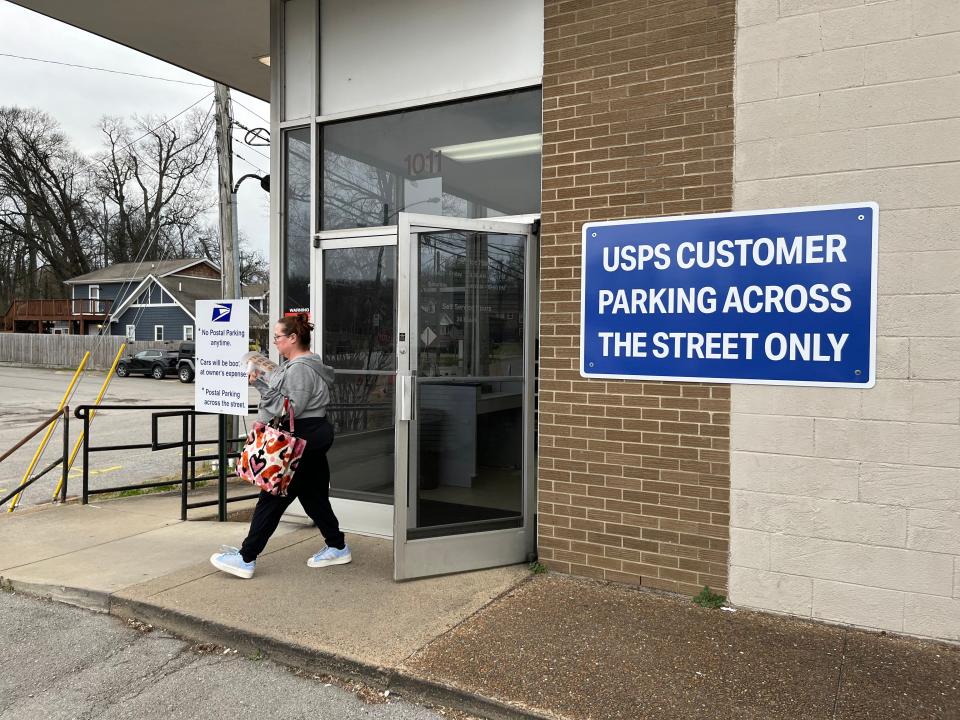
Nashville Booting principal Chip Schmeelk could not be reached for comment. A lawyer representing the company did not respond to a request for comment.
Attorney Mark Hammervold, who is representing the plaintiffs, said the suit can hopefully deter similar violations by companies going forward. The case is set for trial later this year.
Wetherington, the Atlanta-based lawyer, said it will take more than lawsuits to deter bad practices.
"People should not be mad at the booting companies, they should be mad at their local representatives who are aware of these companies and refuse to act," he said. "It's a problem with an easy solution - you either ban it or you enforce regulations."
As for the situation at the Inglewood post office, the building recently posted a much bigger "no parking" sign.
This article originally appeared on Nashville Tennessean: Nashville car booting: Anger grows over practice called predatory

